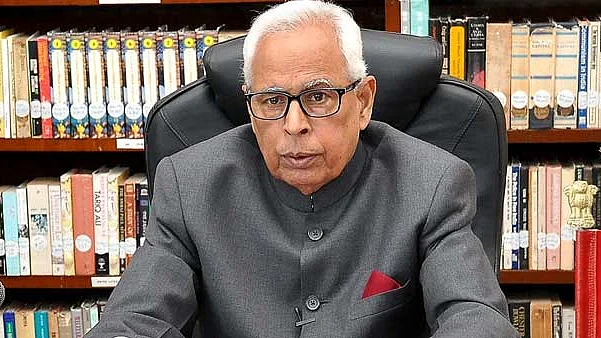J&K: Will Governor’s Rule mean one-man rule?
PM Narendra Modi’s decision to annul BJP’s failed marriage with PDP in JK is just the latest example of the blatant manner in which the entire system of consultation is being bypassed

It has become the norm under Narendra Modi’s rule for the decision-making process to be closely-held within the Prime Minister’s Office. The decision to annul the Bharatiya Janata Party’s (BJP) failed marriage with People’s Democratic Party (PDP) in Jammu and Kashmir is just the latest example.
Even though most ministers and office-bearers have got used to being kept in the dark about political or policy decisions till the last minute, it does give rise to a sense of angst. Some senior party leaders and ministers have sometimes been unable to conceal the pangs of humiliation and embarrassment, especially when they learn about key appointments or policy changes from bureaucrats or journalists.
A few of senior BJP ministers have begun to express their anguish in private, particularly when the decisions taken at the highest level are sudden, irrational or both. All the more because they are invariably expected to justify or explain the decisions in public.
The crux of the issue is not whether the decisions taken are right or wrong. The blatant manner in which virtually the entire system of consultations is being bypassed is the core of the problem. A senior Cabinet Minister is said to have confided to his trusted aides that he was worried about the dangers of circumventing the checks and balances inherent in democratic form of governance
Nobody in BJP knew what was coming when the party pulled out from the J&K government
In the case of the J&K developments, the act of withdrawing support from the PDP was executed so swiftly and in such secrecy that nobody in the BJP knew what was coming —neither the party’s ministers in the J&K coalition nor the party MLAs from Jammu nor the state party chief.
Regional rank and file apart, even in the ruling hierarchy at the Centre nobody had the faintest clue. Union Home Minister Rajnath Singh, who had visited J&K barely a few days earlier, reportedly heard about it on the television news.
Even Ram Madhav, RSS-BJP point man who is usually in the forefront of toppling governments or cobbling together unlikely coalitions in various States, was out of town when the snap decision was taken. He was asked to rush back to the Capital to handle the fallout.
Evidently, it was NSA Ajit Doval who convinced the Prime Minister that it was the opportune time to pull the rug from under Mehbooba Mufti’s feet. The ever-loyal Amit Shah was the only one outside the innermost circle to be the first to be informed, and instructed to take necessary follow-up steps.
All of this is by now an open secret. Even the mainstream media, which under the Modi dispensation no longer pretends to have any “reliable sources” in the PMO, has reported various versions of the back story of the sudden J&K developments.
System of consultations crucial to Parliamentary democracy being bypassed by PMO
The crux of the issue is not whether the decisions taken are right or wrong. The blatant manner in which virtually the entire system of consultations is being bypassed is the core of the problem. A senior Cabinet Minister is said to have confided to his trusted aides that he was worried about the dangers of circumventing the checks and balances inherent in democratic form of governance.
His apprehension was that ignoring the machinery available at various levels of weighing the pros and cons of any far-reaching policy-changes could have grave consequences that would otherwise have been anticipated and factored-in. Decisions arrived at by a single individual or by a small coterie smacks of dictatorship and history has proved that they inevitably tend to aggravate problems rather lead to lasting solutions.
There is confusion on the ground about the intentions and implications of the decision to dismantle the J&K coalition government and hand over the reins of running the state to the Governor. On seven previous occasions, the troubled State has experienced Governor’s Rule, with varying results in different instances.
However, in the present context there is a lack clarity about whether the objective is to adopt a humanitarian approach to tackle the unrest or to use what is being euphemistically referred to as a “muscular policy”.
If the plan is to unleash the armed forces with clear-cut orders to search and destroy terrorists and their harbourers, it would almost certainly create a reign of terror and lead to a backlash of violence and fear.
If, however, the government is hoping to restore peace by reaching out to various sections of the population and initiating development projects and schemes on a significant scale, it would have been far better to have a democratically elected government in place than the virtual army rule under the Governor’s notional supervision.
These are serious questions that ought have been examined in detail before plunging the state into an unexpected spell of direct administration by the Centre. It is doubtful whether the PMO will be able to devote enough time and attention to the ground situation in the Valley over the next six months at a time when it is already under pressure to handle the numerous other serious economic, political and social challenges it faces in other parts of the country. Democracy is always far less dangerous than dictatorship. There are limits to the efficacy of one-man rule.
Follow us on: Facebook, Twitter, Google News, Instagram
Join our official telegram channel (@nationalherald) and stay updated with the latest headlines
